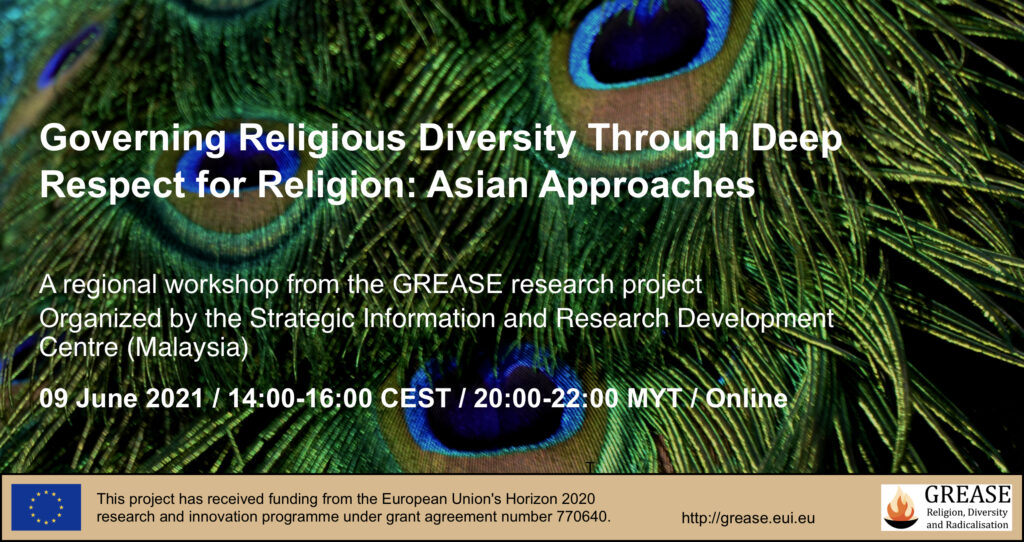09 June 2021 / 14:00 – 16:00 CEST / 20:00-22:00 MYT / Online (Zoom)
Workshop completed. A recording is available. Please send requests to Valentina.Bettin@eui.eu
A GREASE Regional Workshop / Organized by the Strategic Information and Research Development Centre (Malaysia) / Technical Host: European University Institute (EUI) – Florence, Italy

Two-step registration:
1. Create account with EUI or log in to existing account
2. Sign up for workshop
Background
Asia as a region is geographically expansive and populous, characterized by diverse religious and cultural variation. The majority of the countries in this region are home to dozens of different ethnic groups (and in some cases, hundreds) many with their own distinct languages, cultures, and religious ideals. This depth in the demographic range, coupled with a complex historical past coloured by periods of colonialism, affects the way scholars and national leaders have dealt with the question of religious governance.
In contrast to the European experiences, there is no single majority religion that dominates in the Asian region, and different religions predominate in different countries and sub-regions. This crucial feature is manifested in the differing constitutional arrangements in different countries within Asia that give priority to a range of different religions, depending on their majority status. Historically, modern ‘secular’ state institutions in Asia have largely been a product of colonial encounters, often involving the production of the very notions of religiosity and secularity that are distinct and unique. For example, while many Asian states adopted secular forms of government and appeared to embrace rational forms of authority that support such secular forms, religion has never retreated to the private domain. In fact, it continues to be a visible and dominant marker in the social, cultural, and political life of the societies.
These distinctive characteristics of the Asian region, in terms of the historical encounter between religion and the modern state, the range and depth of its religious diversity, and finally its geopolitical complexities, warrant a different mode of inquiry to understand the regulatory modes and practices in governing religions in Asian countries.
Workshop Focus
In the context of the above, this webinar is aimed at discussing the Asian experiences in managing religious diversities in selected Asian countries, namely: Malaysia, Singapore, and Indonesia. It seeks to examine the core values, the prospects, and the challenges that are faced by state and civil societies in engaging with religious governance.
Key Questions:
- How does the religious make-up of today’s Asian (particularly Southeast Asian) societies differ from what’s found in the West?
- How is secularism in these societies positioned vis-à-vis religious governance?
- What are the main challenges of managing diversity in these societies?
PROGRAMME
Introduction by moderator
Imran Mohd Rasid, Research Fellow, Strategic Information & Research Development Centre, Malaysia
Opening speech
Prof. Wan Zawawi Ibrahim, Principal Researcher, GREASE Research Project, Malaysia
Presentations
Dina Zaman, co-founder, IMAN Research, Malaysia
> Enabling Extremism: The Relationship Between Politics, Race, Radicalisation & Anger
Dr. Pradana Boy, Head of the Center for the Study of Islam and Philosophy, University of Muhammadiyah, Malang, Indonesia
> Indonesian Discourse of Religious Moderation: A New Approach to Religious Diversity and Extremism
Dr. Ahmad el-Muhammady, Assistant Professor, International Institute of Islamic Thought and Civilisation (ISTAC-IIUM), Malaysia
> Spiritual Governance and Religious Literacy in Malaysia’s Rehabilitation Program
Dr. Noshahril Saat, Senior Fellow, ISEAS – Yusof Ishak Institute, Singapore
> Managing non-violent extremism: The role of alternative discourses in Southeast Asia
— Final 30 min. Q&A —
